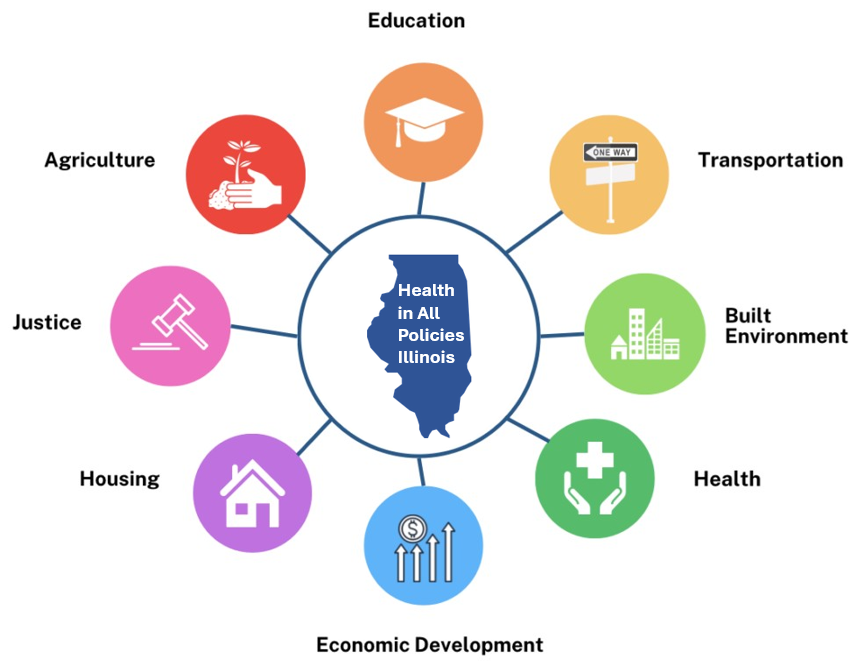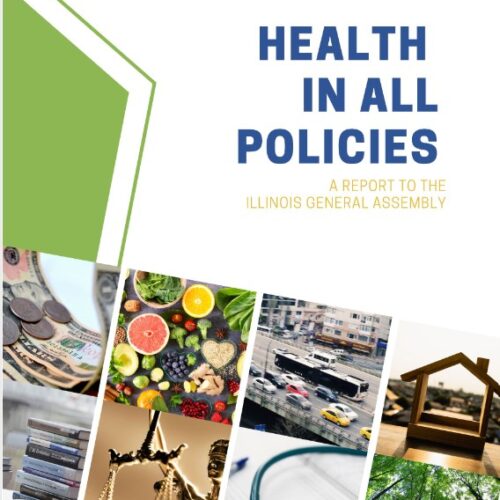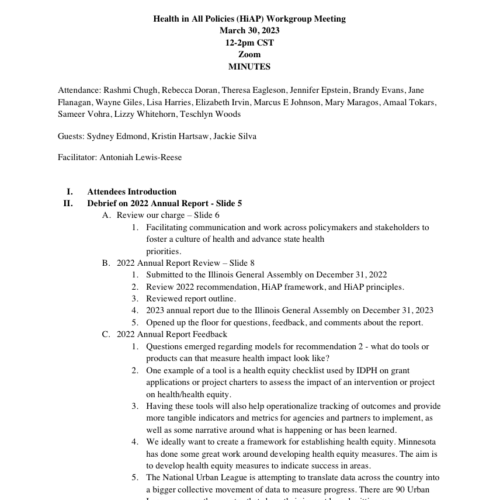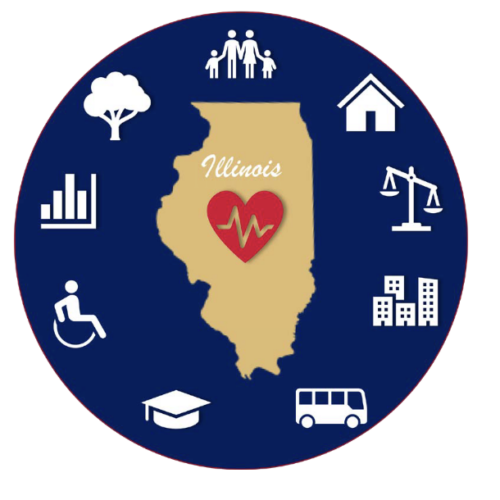Health in All Policies Workgroup

About the Health in All Policies (HiAP) Workgroup
Co-led by the UIC School of Public Health and the Illinois Department of Public Health, the Health in All Policies Alliance is one of few state-wide workgroups across the country convened through legislation to examine health outcomes and make recommendations to advance health equity through policy, practice and partnership. Passed by the Illinois General Assembly on January 1, 2020, the Health in All Policies Act (410 ILCS 155/10(a) thru 155/10(i)) brings cross-sector leadership together from 22 state and local health and community organizations.
Meet our team and partner agencies
Join our Health In All Policies Alliance Meetings
Our next meeting: Friday, May 16, 2025, 12-2pm
Location: UIC School of Public Health 1603 W. Taylor Street, Room 1136 Chicago, IL 60612
Open Comments: The Health in All Policies workgroup is considered a “public Board or Commission” under the State Open Meetings Act, 5 ILCS 120/1 et seq. Meetings are therefore open to the public and provide for an Open Comment period at the top of the agenda for members and non-members. If you would like to provide comments (ideal time limit: 3 minutes), please complete our form located here.
Health in All Policies Framework

The “health in all policies framework” is a public health framework through which policymakers and stakeholders in the public and private sectors use a collaborative approach to improve health outcomes and reduce health inequities in the state by incorporating health considerations into decision-making across sectors and policy areas.
Health in All Policies principles are as follows:
- Promote health, equity, and sustainability.
- Enhance cross-sector collaboration.
- Benefit multiple partners.
- Engage stakeholders.
- Create structural and procedural change.
Read our 2024 Annual Report
2024 Recommendations
The Health in All Policies (HiAP) Workgroup submitted the following recommendations to the Illinois General Assembly on December 31, 2024 as part of their 2024 annual report on neighborhood and built environment, with emphasis on aspects that enable active living, access to care and supportive services, access to healthy food, and environmental justice most relevant to the priorities of the Illinois State Health Improvement Plan:
About Preparing Local Communities
Support programs that prepare local communities to assess health impacts of economic development initiatives.
Protecting public health requires a cross-stakeholder approach starting at the point of impact – individuals and communities. Providing training and resources to support self-advocacy is critical to advancing the mission of public health. The first steps in advocating for one’s health are knowing your health status, understanding how your health is impacted by your behaviors and environment (which are shaped largely by policy), and defining what you/your community need/s to support health.
About Community Engagement Standards
Implement a community engagement policy for infrastructural changes.
Encouraging community engagement through public forums requires implementing policies that support local decision-making while prioritizing equity and addressing potential barriers to participation. As articulated in the Illinois Environmental Protection Agency’s Enhanced Public Participation Plan, community meetings are often held at times that are not aligned with typical work schedules or after work when family and other responsibilities can be prohibitive. Further, notification processes rely on print and email channels. Improving attendance at meetings during the developmental stages of a project can make or break implementation efforts.
Setting standards for different types of projects creates an expectation of transparency for community members and businesses and ensures accountability. Illinois should establish a robust, standardized community engagement policy to ensure that every affected resident has an opportunity to hear and respond to manufacturing, commercial, developmental, and infrastructural projects and that plans are customized to the local community’s unique needs and health priorities.
About Health Equity-centered Decision Support Tools
Integrate comprehensive decision support tools that center health equity in development.
Regional Development Authorities (IL-RDAs) should be informed of the health status of their counties’ residents if they decide to fund projects that best serve their regions. In addition, they should be aware of inequitable burdens and community health histories that may create cumulative impacts on the communities they serve. Businesses and community members should also have access to the same information to assess risk. In practice, this may look like:
- Facilitating collaboration between RDA administrators and IDPH and/or local health departments to secure health outcomes and social determinants data by county and Regional Economic Development (RED) zones. Data should also be provided at the hyperlocal level to facilitate impact.
- Creating stricter health impact assessment requirements for permit approvals so that businesses and local municipality decision-makers can access the health and safety data to assess risks to target communities.
- Allocating funds for IDPH and local health departments to increase capacity to conduct its public health assessments and health consultations on a timeline that does not slow project initiation or hinder transparency in community engagement efforts.
- Expanding the utility of existing data tools across the IEPA, IDPH, IDCEO, IDOT and other local and national agencies by connecting data already being collected and made publicly available.
- Making existing tools and end-to-end process overviews easily accessible across all stakeholder agency sites in one standard location.
- Establishing a formula to calculate the burden of a project on communities that considers factors such as current community health status, social determinants of health, existing exposures to hazards, history of disparity, and degree of exposure. For example, IDOT uses a Data-driven Decision Tool based on defined goals and criteria to help them select capacity projects in a transparent and equitable manner.
Our Work



